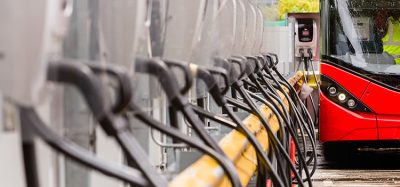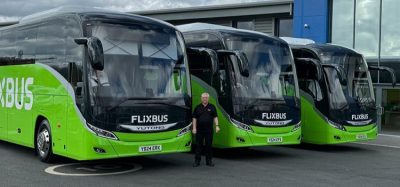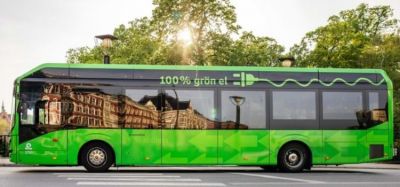Facing the future head-on: How First Bus is combating tough times in the bus industry by investing in new, green vehicle technologies
- Like
- Digg
- Del
- Tumblr
- VKontakte
- Buffer
- Love This
- Odnoklassniki
- Meneame
- Blogger
- Amazon
- Yahoo Mail
- Gmail
- AOL
- Newsvine
- HackerNews
- Evernote
- MySpace
- Mail.ru
- Viadeo
- Line
- Comments
- Yummly
- SMS
- Viber
- Telegram
- Subscribe
- Skype
- Facebook Messenger
- Kakao
- LiveJournal
- Yammer
- Edgar
- Fintel
- Mix
- Instapaper
- Copy Link
Posted: 6 April 2017 | Giles Fearnley, Managing Director of First Bus | No comments yet
Giles Fearnley, Managing Director of First Bus, discusses how the transport operator is overcoming tough conditions in the bus industry head-on by trailing and investing in new, green vehicle technologies.
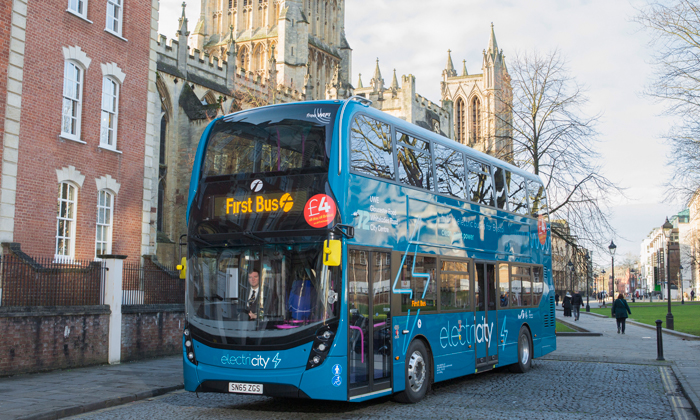

As 2016 rapidly becomes a distant memory and we settle into 2017, the bus industry continues to find conditions tough with congestion in particular rightly widely heralded as a huge problem for operators and their customers across the UK.
In response, we must do all that we can to:
- Stimulate passenger growth
- Control our costs
- Work with our partners to improve bus priorities and speed up the bus – which is so important to the future success of the industry and the communities which we serve.
Our investment in greener, cleaner vehicles is helping us fight on all three fronts.
Euro VI technology
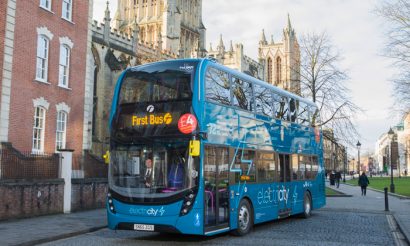

First Bus is combating tough times in the bus industry head-on
Central to the First Bus vehicle procurement strategy is Euro VI technology. We tested it and immediately saw the huge benefits, particularly around air quality, and acted quickly. In 2016, we announced a £73 million order for 355 EURO VI buses; the biggest investment the industry had seen and a huge endorsement for the technology. This follows investment in 2015 and we now operate over 630 Euro VI buses - more than 10% of our fleet.
Other vehicle technologies
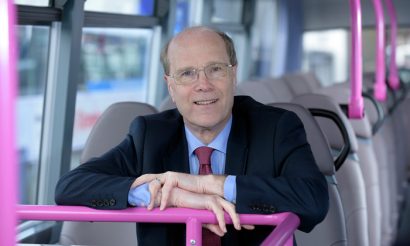

Giles Fearnley, Managing Director of First Bus
We are also trialing a range of other vehicle technologies. In Aberdeen, with our partners, we’re successfully testing four hydrogen fuel cell vehicles. In York, a fleet of 12 electric vehicles operate two Park and Ride services and recently won the ‘Contribution to Sustainable Transport’ prize at the North of England Transport Awards. Meanwhile, in Bristol, by many considered the bedrock of environmental innovation, we operate two ‘virtual electric’ (part hybrid, part electric) vehicles and have recently completed a trial of a bio methane vehicle, popularly known as the ‘poo bus’.
The results of the bio-methane trial were really positive, so much so that with partners in the West of England we submitted a joint bid to OLEV for 110 vehicles. Although unsuccessful in our bid for funding, it has not dampened our appetite, nor that of our partners, for bio-methane vehicles. We’re confident they will form part of our UK fleet in the short-to-medium term so watch this space!
We must also not lose sight of the opportunities right in front of us. I’m fiercely proud to be leading the industry, developing with our partners new innovative technologies that are improving fuel efficiency and carbon emissions of vehicles that are affordable, sustainable and available on the market right now.
The Millbrook trials
Back in 2012 we launched what has become an annual vehicle testing programme (see video below) at Millbrook Proving Ground. In so doing we laid down the gauntlet to vehicle manufactures to improve their products, triggering a competitive development race. Since 2012 we’ve seen a reduction in the weight of vehicles, the recapture of brake energy, and the introduction of stop/start technology.
Indeed, thanks to the Millbrook trials and a strong partnership with Wrightbus, we also tested, developed and helped bring to market the hugely successful ‘Streetlite Micro Hybrid’ product. We now operate 618 of these vehicles across the UK.
The Millbrook trials have been exceptionally successful (which helped us win ‘Low Carbon Operator of the Year 2016’ at the Low Carbon Champions Awards). We’re seeing vehicle fuel economy improvements of up to 30%, and we’re reducing carbon emissions by 30% too. These are incredible numbers that are making a difference to costs and helping keep fares down not just at First Bus but across the industry. We think there is another 10% that can be delivered by manufacturers in 2017.
Air quality
We know that air quality is now top of the agenda for so many of our towns and cities and the impact that clean/green buses can make is widely understood. Through effective partnerships we can flesh out how plans can be delivered to meet this agenda.
We have seen this play out most recently in Leeds where essential to the objective of doubling bus patronage over 10 years, is investment in the bus fleet to meet the stringent Clean Air requirements that will apply in that city from 2020.
Clean/green vehicles can themselves do so much to fundamentally change the perception of the bus product which itself is a stimulus to attract new users and to enable the bus to unleash its full potential in contributing to economic prosperity in our towns and cities.
Related topics
Air Quality, Alternative Power, Business Models, Fleet Management & Maintenance, Multimodality, Sustainable Urban Transport, Ticketing & Payments, Transport Governance & Policy
Related modes
Bus & Coach
Related people
Giles Fearnley





